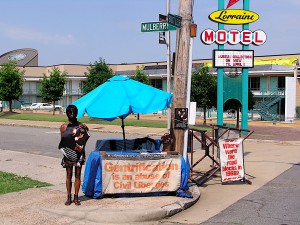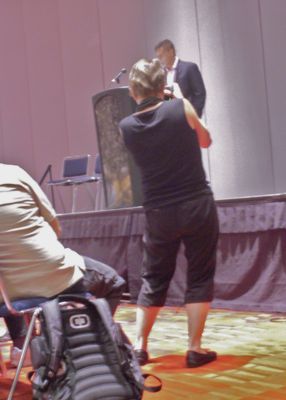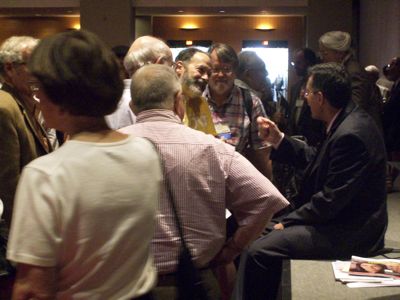Carol and I went over to the Civil Rights Museum this afternoon. The museum has been constructed on the site of the Lorraine Motel, where Rev. Dr. Martin Luther King, Jr., was shot and killed on 4 April 1968. The exhibits are well-done and exhaustive, and very heavy on text — it took me two hours to read through the exhibit material, skipping over about half of the reproduction documents and explanatory text, and I only got halfway through the museum. You read about the big events — the sit-ins, the Freedom Riders, the Highland Folk School, and so on — but you also get to read about some of the smaller cities where things happened, and the one-person sit-ins that took place. For me, though, the most powerful moment in the museum was towards the end of the documentary film that served as an introduction to the museum, when Rev. Billy Kyles tells the filmmaker that King got shot because he was beginning to talk about economic inequality; in Kyles’s opinion, when King spoke out about economic inequality, that was more dangerous than speaking out about racial injustice. Given the increasing economic inequality in the United States today, that really struck home for me.
We headed out of the dark air-conditioned museum into the heat of a bright, sunny Memphis afternoon. Carol wandered over to where a woman sat behind a booth under an umbrella. On the front of the booth was a sign that read “Gentrification is an abuse of Civil Liberties.” We got to talking with the woman, whose name was Jacqueline Smith. She was the last person to live in the Lorraine Motel — apparently it housed quite a few permanent residents in the 1980s. The state of Tennessee forcibly evicted her in January, 1988, so they could take over the Lorraine Motel and turn it into the Civil Rights Museum. She said she believes that a more fitting monument to King would have been to turn the Lorraine Motel into housing for the poor, or some other project that furthered King’s ideals. She also pointed out how the neighborhood was being gentrified. “There’s an American Apparel store now, over in the next block,” she said scornfully. “Where are the poor people supposed to live?” She has a point. Chain stores like American Apparel usually mean the death of small locally owned businesses. In an article in today’s New York Times business section titled “A Slowdown for Small Businesses,” reported Catherine Rampell points out that small businesses are not doing well these days:
While big companies are buoyed by record profits, many small businesses, which employ half the country’s private sector workers, are still struggling to break even. And if the nation’s small businesses plan to further delay hiring — or, worse, return to laying off workers, as they now hint they might — there is little hope that the nation’s 14 million idle workers will find gainful employment soon. [p. B1]
Jacqueline Smith pointed out that the Civil Rights Museum was sponsored by many large businesses. I had already noticed that — half of one memorial mounted below Room 306 in the Lorraine Motel, the room where King had been staying before he had been shot, was devoted to extolling the virtues of its big corporate sponsor. That struck me as crass commercialism, at best; or disrespectful, at worst; take your pick.
Carol asked if we could take Jacqueline Smith’s photo and post it here, and she said we could. Ms. Smith also gave us a poster showing Dr. King, with the words “I tried to be right, I did try to feed the hungry, I did try to clothe the naked, I tried to love and serve humanity,” and in the photo below she is holding this poster. You can see the balcony where King was shot just above her in the photo.

Photo by Carol Steinfeld.
Ms. Smith has her own Web site where she promotes her point of view. She says in part: “Sadly, [the Civil Rights Museum] fails to live up to [its] ideals. The truth is that the museum has become a Disney-style tourist attraction, which seems preoccupied with gaining financial success, rather than focussing on the real issues.” And this raises the very interesting question for me: has Martin Luther King’s legacy become too sanitized?




